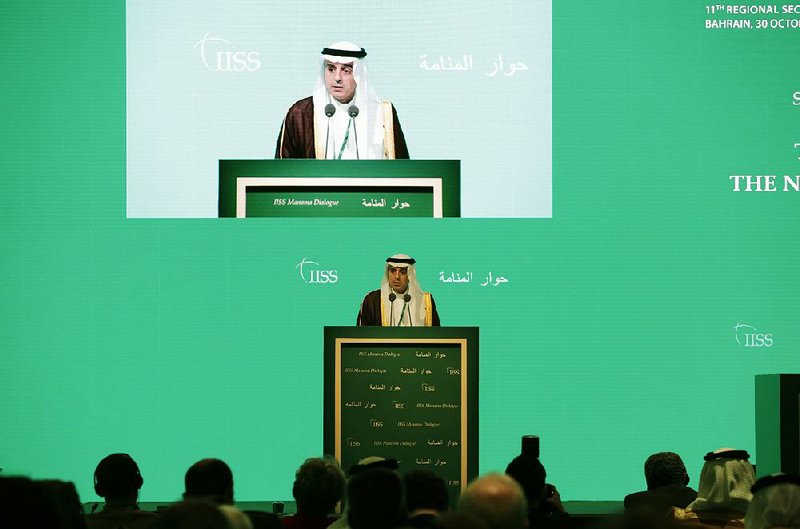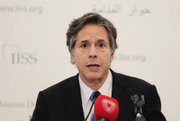MANAMA, Bahrain -- The United States ramped up its support for Syria's opposition Saturday with a pledge of nearly $100 million in fresh aid.
Deputy Secretary of State Antony Blinken announced the additional assistance at the Manama Dialogue security conference in the Persian Gulf island nation of Bahrain.
The U.S. funds will support local and provincial councils, civil-society activists, emergency services and other needs on the ground inside Syria.
The American promise of cash, which it says brings to nearly $500 million the amount it has pledged to the opposition since 2012, came a day after the U.S. announced it was intensifying its fight against the Islamic State group in Syria with the deployment of up to 50 special operations troops to assist Kurdish and Arab forces in northern Syria.
U.S. Secretary of State John Kerry, speaking at a news conference in Kyrgyzstan, said the troops will only fight Islamic State militants and won't become involved in the long-running civil war. But Kerry didn't rule out further U.S. action, saying he can't predict the future.
Blinken said that, after some 7,700 airstrikes against the Islamic State in the past year, the U.S.-led coalition targeting the group has made "significant gains." The Islamic State has 30 percent less territory than it did a year ago because of coalition efforts, Blinken said.
"There is demonstrable, significant progress as a result of the efforts of the coalition working in partnership with the Iraqi government" and the Iraqi people, Blinken told reporters.
In Iraq, he said, the coalition has helped secure Baghdad and Irbil, the capital of the Kurdistan region, and recaptured the Mosul dam, while 85 percent of people have returned to the city of Tikrit. The coalition is also moving on to Ramadi, Blinken said. In northern Syria, forces have secured 85 percent of the Turkish-Syrian border, he said.
In the Syrian civil war, there's growing recognition that "there is no military way forward" and that Assad has "already forfeited" most of his country, Blinken said. An air campaign by Russia, which says it's targeting the Islamic State in Syria, has made few gains, he said.
"There's been an onslaught of Russian bombs dropping indiscriminately against anyone who opposed Assad," Blinken said.
If the Russian intervention is not aimed at the Islamic State, then its campaign could negatively affect Iraq and reinforce the extremist group, Iraqi Defense Minister Khaled al-Obeidi said during a speech in Manama on Saturday.
Disagreement on Assad
The aid announcement coincided with the completion of international talks in Vienna to pursue a new peace effort involving Syria's government and opposition groups. The negotiations left open the question of when Assad might leave power, and it was unclear whether he or the disparate rebel groups fighting to topple him would sign on to any peace proposal.
A new round of talks was expected to take place within two weeks.
British Foreign Secretary Philip Hammond said the fact that the talks in Vienna included regional rivals Saudi Arabia and Iran was an achievement in itself.
But Saudi Foreign Minister Adel al-Jubeir, who arrived at the Bahrain conference from Vienna, seemed to downplay the significance of what had been accomplished, telling delegates in Bahrain that "we have not been able to reach agreement."
Al-Jubeir told delegates at the conference that the timing of Assad's departure and the withdrawal of foreign fighters remain the main sticking points to finding a lasting resolution to the civil war in Syria.
He said the kingdom's policy toward Syria has not changed and that it would continue to support what he called the moderate Syrian opposition.
He described the presence of foreign forces, particularly Iranian troops, as a roadblock to ending the fighting in a war that has killed more than 250,000 people and forced 11 million from their homes.
Shiite powerhouse Iran, like Russia, is a longtime ally of Syria. The Islamic Republic has given Assad's government billions of dollars in aid and large amounts of weapons since fighting began.
Iran has deployed what it says are military advisers to support the government and has had casualties in the conflict, though it denies the presence of Iranian combat troops in Syria.
Pro-Iranian fighters from Lebanon, Iraq and Afghanistan also have traveled to Syria to fight alongside Assad's forces.
Al-Jubeir made clear that the negotiations had done nothing to change Saudi Arabia's position that Assad must go.
"Ideally he should leave this afternoon. The sooner the better," al-Jubeir said.
Blinken suggested that Russia's military intervention in Syria, though widely seen as a strong sign of support for Assad, could give Moscow an incentive to work toward a political transition that removes him from power.
Russia began conducting airstrikes in Syria in late September that benefit Assad's forces, though it has also said it is ready to aid rebel groups fighting the Islamic State.
"Russia cannot afford to sustain its military onslaught against everyone opposed to Assad's brutal rule. The costs will mount every day in economic, political and security terms -- but at best only to prevent Assad from losing," Blinken said.
He predicted a "quagmire" that draws Russia deeper into a conflict alongside Syrian allies Iran and the Shiite militant group Hezbollah, and which alienates Sunni Muslims both in the region and in Russia.
U.N. Secretary-General Ban Ki-moon said from Geneva that the talks "should not be held up over the future of one man," referring to the disagreement over Assad. He also urged a nationwide cease-fire to allow the delivery of humanitarian assistance to the millions of people in need of food and medical aid.
Ban and the head of the International Committee of the Red Cross, Peter Maurer, issued what they called "an unprecedented joint warning" on lassitude in confronting suffering caused by conflicts around the globe.
Without greater international commitment to maintaining peace and security, "we can expect only greater chaos and suffering," he told journalists. "The continued failure to act is a disgrace."
As evidence of the horrific toll of conflict on civilians, Ban cited missile attacks launched Friday by Syrian government forces on the town of Douma, a rebel-held suburb of Damascus, which reportedly killed dozens of people, and indiscriminate airstrikes on other populated areas.
International medical aid organization Doctors Without Borders said Saturday that the airstrike and shelling in a market in Douma killed at least 70 people and wounded 550.
Syrian criticizes U.S.
In Syria, a member of parliament criticized the U.S. decision to send troops into Syria, saying it is an act of aggression because it does not have the government's agreement.
Sharif Shehadeh said the troops will have no effect on the ground but that the U.S. wants to say it is present in Syria.
"What has happened to make America realize, after five years, that it should send between 30 and 50 military advisers?" asked Shehadeh, referring to the start of the country's crisis in March 2011.
The U.S.-led coalition has been targeting the Islamic State with airstrikes since September 2014, killing 12,000 extremists without weakening the group.
The decision to send U.S. troops to Syria came a month after Russia began launching airstrikes against insurgents in the country. Russia's airstrikes were approved by the Syrian government.
"When America sends ground forces into Syrian territories without an agreement with the Syrian government, it becomes an intervention and aggression," Shehadeh said. "Will America allow Russian ground forces to go into America without an agreement? I think the answer is no."
The U.S. decision came as activists said some rebel groups, as well as the main U.S.-backed Kurdish militia, are preparing for an offensive against the Islamic State in its de facto capital of Raqqa, Syria. Last month, U.S. cargo planes dropped small arms and ammunition to Arab groups fighting the Islamic State in northern Syria in what appeared to be preparation for the attack.
On Saturday, the Democratic Forces of Syria, a coalition of Arab, Christian and Kurdish factions in northern Syria, declared that they have started an operation to "liberate" areas south of the northeastern city of Hassakeh.
The Islamic State has several strongholds in the predominantly Kurdish province of Hassakeh, which borders Iraq.
The announcement was carried by the Britain-based Syrian Observatory for Human Rights and social media pages of rebel groups.
Information for this article was contributed by Adam Schreck, Albert Aji, Bassem Mroue, Bradley Klapper and staff members of The Associated Press; by Nafeesa Syeed of Bloomberg News; and by Nick Cumming-Bruce of The New York Times.
A Section on 11/01/2015



